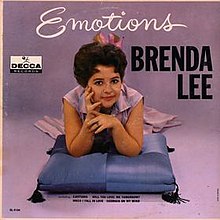
"Walkin' After Midnight" is a song written by Alan Block and Don Hecht and recorded by American country music artist Patsy Cline. The song was originally given to pop singer Kay Starr; however, her label rejected it. The song was left unused until Hecht rediscovered it when writing for Four Star Records. Originally Cline was not fond of "Walkin' After Midnight", but after making a compromise with her label she recorded it. However, the first released recording was by Lynn Howard with The Accents, released in August 1956.
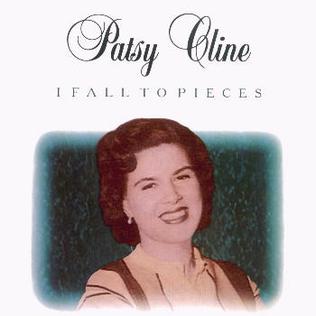
"I Fall to Pieces" is a song written by Hank Cochran and Harlan Howard that was originally recorded by Patsy Cline. Released as a single in 1961 via Decca Records, it topped the country charts, crossed over onto the pop charts and became among Cline's biggest hits. Cline was initially reluctant to record "I Fall to Pieces" and believed its production lacked enough country instrumentation for her liking. Eventually, Cline recorded the song upon the encouragement of her producer.

Sentimentally Yours is the third studio album by American country music singer Patsy Cline, released August 6, 1962. The album was the final studio album Cline would release before her death in a plane crash less than a year later.

Thunder & Roses is the seventh studio album by American country music artist Pam Tillis. It was released on March 6, 2001 by Arista Nashville. It is also the last album she recorded for the Arista label. Its lead-off single, "Please", was a #22 hit on the Billboard Hot Country Songs charts in 2002. "It Isn't Just Raining" was later recorded in 2003 by its co-writer, Jennifer Hanson, on her self-titled debut album, and the title track was previously recorded by Mindy McCready on her 1999 album I'm Not So Tough. "Please" would go on to be Pam's last appearance on the Country Singles Chart after it peaked in spring of 2001.
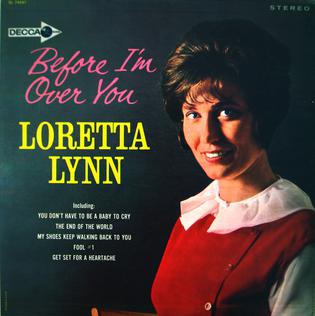
Before I'm Over You is a studio album by American country singer-songwriter Loretta Lynn. It was released on June 22, 1964 via Decca Records and was produced by Owen Bradley. It was Lynn's second studio album issued in her recording career and contained a total of 12 tracks. Two songs from the record were released as a singles and became major hits on the Billboard country chart: the title track and "Wine, Women and Song." The album received positive reception from music publications after its release.
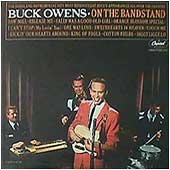
On the Bandstand is an album by American country music artist Buck Owens, released in 1963. It peaked at Number 2 on the Billboard Country Albums charts.

Here's the Answer is the second studio album by American country artist Skeeter Davis. The album was released in January 1961 on RCA Victor Records and was produced by Chet Atkins. The album consisted of cover versions of hit singles by country artists and answer songs to the hits.

Grandma, What Great Songs You Sang! is the debut studio album by American singer Brenda Lee. The album was released on August 3, 1959 on Decca Records and was produced by Owen Bradley. The album was Brenda Lee's only studio album released during the 1950s.

Brenda Lee is the second studio album by American singer Brenda Lee. The album was released August 1, 1960 on Decca Records and was produced by Owen Bradley. The album's second single "Sweet Nothin's" became Lee's first major hit single on the Billboard Hot 100, peaking within the Top 10. This was followed by the third single "I'm Sorry" released the following year that became her first single to top the Billboard Hot 100.

This Is...Brenda is the third studio album by American singer Brenda Lee. The album was released on October 10, 1960, on Decca Records and was produced by Owen Bradley. The release was Brenda Lee's second studio album released during 1960 and contained the single "I Want to Be Wanted", which became a number one single on the Billboard Hot 100.

All the Way is the fifth studio album by American singer Brenda Lee. The album was released August 7, 1961, on Decca Records and was produced by Owen Bradley. It was the second of two studio albums released by Brenda Lee in 1961 and spawned the single "Dum Dum", which became a Top 10 hit on the Billboard Hot 100, and a UK single "Speak to Me Pretty", which reached No.3 on the UK singles chart.

Sincerely is the sixth studio album by American singer Brenda Lee. The album was released February 12, 1962 on Decca Records and was produced by Owen Bradley. It was the first of two studio albums released by Brenda Lee in 1962 and did not contain any singles.

Brenda, That's All is the seventh studio album by American singer Brenda Lee. The album was released October 15, 1962 on Decca Records and was produced by Owen Bradley. It was the second of two studio albums released in 1962 and included two Top 10 hit singles on the Billboard Hot 100 between 1962 and 1963.

All Alone Am I is the eighth studio album by American singer Brenda Lee. The album was released February 18, 1963, on Decca Records and was produced by Owen Bradley. The album was the first of two studio albums released in 1963 and the album's title track became a Top 10 hit on the Billboard Hot 100.

..."Let Me Sing" is the ninth studio album by American singer Brenda Lee. The album was released December 9, 1963, on Decca Records and was produced by Owen Bradley. The album was the second and final album studio album released by Brenda Lee in 1963.
"Emotions" is a song written by Ramsey Kearney and Mel Tillis which became a Top Ten hit for Brenda Lee in 1961.

I Love You Drops is a studio album by American country singer-songwriter Bill Anderson. It was released in August 1966 on Decca Records and was produced by Owen Bradley. It was Anderson's fifth studio release and included three singles that became major hits on the Billboard country chart. The album would also become a success on the Billboard country albums list upon its release, becoming one of his most successful charting albums.

"Gotta Lot of Rhythm in My Soul" is a song first recorded by American country singer Patsy Cline. It was composed by W.S. Stevenson and Barbara Vaughan. It was released as a single in 1959 via Decca Records and was produced by Owen Bradley. It was among a handful of singles released on the Decca label that were unsuccessful for Cline following a major hit in 1957.
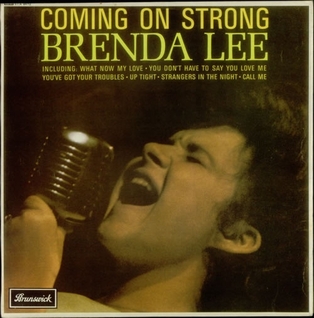
Coming on Strong is a studio album by American singer Brenda Lee. It was released on November 28, 1966, via Decca Records and was her seventeenth studio project. The album consisted of ten tracks, many of which were covers of songs recorded by other artists. The album's title track was the only single included. It reached the top 20 on the US record chart and the top ten of the Canadian record chart. The album itself also made the US chart following its release. Coming Strong received mixed reviews from critics following its release.
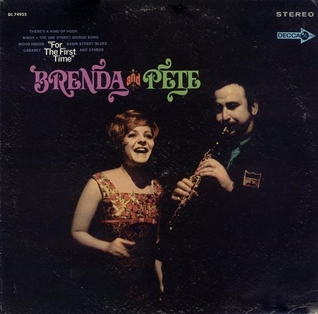
For the First Time is a studio album by American singer Brenda Lee and American instrumentalist Pete Fountain. Credited under the names "Brenda and Pete", For the First Time was released by Decca Records on March 15, 1968, and featured 11 tracks. The recordings featured Lee performing lead vocals while Fountain provided instrumentation solos on his clarinet. The album was met with positive reviews from critics following its release. It also made the US albums chart in 1968.
